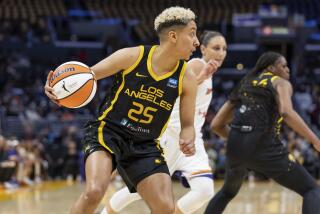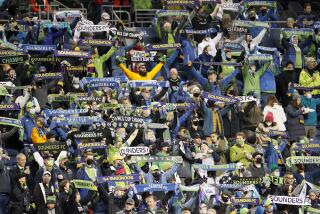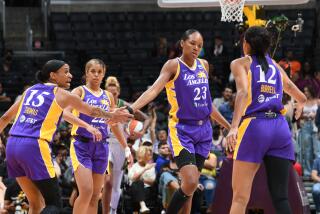Seattle’s Payton Raises Game to Another Attitude
- Share via
You could spend an entire game watching Gary Payton’s facial expressions.
In addition to the constant air of detached confidence, Payton can contort his face into scowls of disapproval over bad calls or wrinkles of frustration. Watch him sink a shot and see a brief, self-satisfied wave of contentment wash over his face before he heads back to play defense.
He’s the only player in the NBA who throws the entry pass with attitude, lobbing the ball into the low-post player with an expression that asks (of whom, no one knows), “You got a problem with that?”
See, even when Payton isn’t talking, he’s saying something.
And lately the unmistakable message from his play is that he isn’t about to let the Seattle SuperSonics end their season.
They trail the Lakers, 2-1, in this best-of-seven series. Two more losses and it’s over.
That’s nothing. One loss in their first-round series against the Minnesota Timberwolves would finished them off. Payton wasn’t ready to leave.
He played 46 minutes and had 24 points, eight assists and six rebounds as the SuperSonics won Game 4. He came back and played the full 48 minutes to get 29 points with four assists and four steals in the decisive Game 5.
Even when defeat looked inevitable with a 15-point fourth-quarter deficit in Game 3 of this series Friday night, Payton fought it off with two assists, a jump shot and a steal in 90 seconds to help Seattle pull within three.
“Since the playoffs started, I see a different approach, a different attitude, a seriousness that I haven’t seen from Gary,” veteran SuperSonic Nate McMillan said. “I see leadership I haven’t seen, I see responsibilities for situations.
“Playing 48 minutes [against Minnesota] and not even thinking about coming out of the game. Just making comments. His face during the game. Not a lot of talking, everything is done on the floor.”
For Payton to go without talking is like a shark going without water. Payton constantly is ranked among the game’s top trash talkers by his peers. He rarely passes quietly through the SuperSonics locker room. If anyone comes in his vicinity, he’s liable to hear something from Payton.
Payton spent a good chunk of time before the first two games of this series debating the merits of a particular Eastern Conference point guard with one of the Seattle beat writers. Payton kept grinding and grinding until his point had been made, even making a return trip from the trainer’s room to harp on the subject.
But for all of his verbosity, Payton isn’t that adept with the media. Unlike his friend Shaquille O’Neal, who is one of the most accessible (although often least audible) superstars in the game, Payton doesn’t like to meet the press. He does not do interviews before games, didn’t speak to reporters after Seattle’s Game 2 loss and was invisible during the media session the next day.
Saturday, he said there’s little to discuss except the SuperSonics need to play better defense. He didn’t plan to tell that to any of his teammates, simply show them instead.
“If I play hard, just let them come with me,” Payton said. “That’s what I want to do.”
In the 1996 NBA finals, it was Shawn Kemp who called out his Seattle teammates for their poor play against the Chicago Bulls in losing the first three games, and it was Kemp who led the SuperSonics back into the series in the next two games.
Kemp had 47 points and 21 rebounds in those next two games and appeared ready to enter the next echelon of NBA stars. That’s what everyone wrote at the time. Payton went about his business, scoring 44 points and getting 17 assists in those games, in addition to taking on the duties of guarding Michael Jordan.
That summer, Payton signed a seven-year, $88 million contract. While Kemp spent the next season stewing about his contract status, Payton settled in. Kemp finally got his wish to leave in a trade last September.
Vin Baker, Kemp’s replacement in the three-team trade, did a fine job of filling in during the regular season. He’s finding out that the playoffs are an entirely different matter, and Payton is filling that big-game experience void.
“He wants to win, he is the guy running the show here,” McMillan said. “He has taken it upon himself to make plays for us. I don’t know if he just felt it wasn’t his team before, or he wasn’t in position. Whatever the reasoning now, I just see him with a seriousness I haven’t seen.”
“I’m doing what I’m supposed to do,” Payton said. “This is what the Sonics pay me to do. They pay me to play basketball and make this team win, and that’s why they gave me the big contract, to do what I’m doing now.
“Everybody looks up to me to energize our team. Yeah, I am the energizer of our team. Whatever they want to put on me, I’ll take it. If we lose, it’s my fault or whatever. I think that I have to do a little bit more.”
The SuperSonic announcers like to borrow a line from the Kirk Franklin song and say “G.P., are ya with me?”, but really there’s no need to ask. Payton is always there.
He has missed only two games in his seven-year career, one because of injury and one because of league suspension.
Coach George Karl calls Payton “our A-plus option.”
His game continues to evolve and improve. Take three-point shooting. He made only one in 13 tries as a rookie, but his shooting percentage increased in every year but one since then. This season he made a career-high 33.8% (134 for 397) even though the three-point distance was moved back to 23 feet, nine inches. And despite his skeletal 6-4, 180-pound frame, he has developed into one of the league’s tougher players to defend in the low post.
He ranks as the game’s top point guards, gets plenty of commercial exposure (gotta love those “Fun Police” ads) and yet he never gets serious most-valuable-player consideration.
One reason is that reputations are forged in late May and June, and too often the SuperSonics haven’t been around then.
Most of that has fallen back on Karl’s head, but if Payton has been the heart of this team, then it’s his responsibility too.
Right now it would be hard to blame Seattle’s current predicament on him. Nevertheless, if he wants his due accolades he’ll have to find a way to keep his team alive even though the rest of the components are crumbling.
Whatever happens to Seattle the rest of the season will be Payton’s doing. If they win a championship, it will be because Payton delivered it.
Imagine the look on his face then.
More to Read
Go beyond the scoreboard
Get the latest on L.A.'s teams in the daily Sports Report newsletter.
You may occasionally receive promotional content from the Los Angeles Times.










